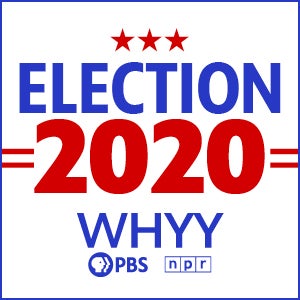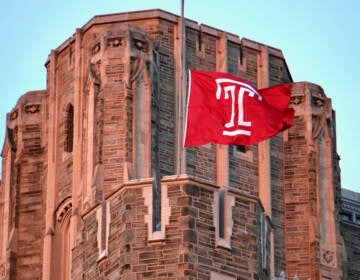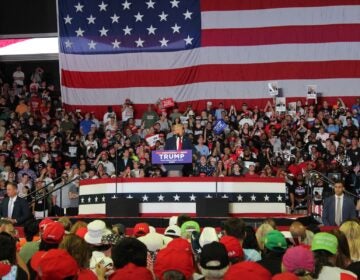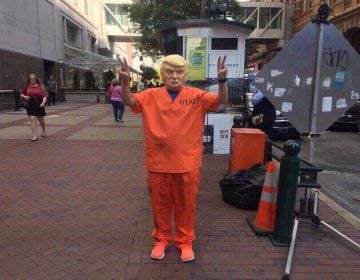Believing in your own power: Lessons from N.H. primary
Temple University students are learning more than journalism skills while covering the New Hampshire primary.
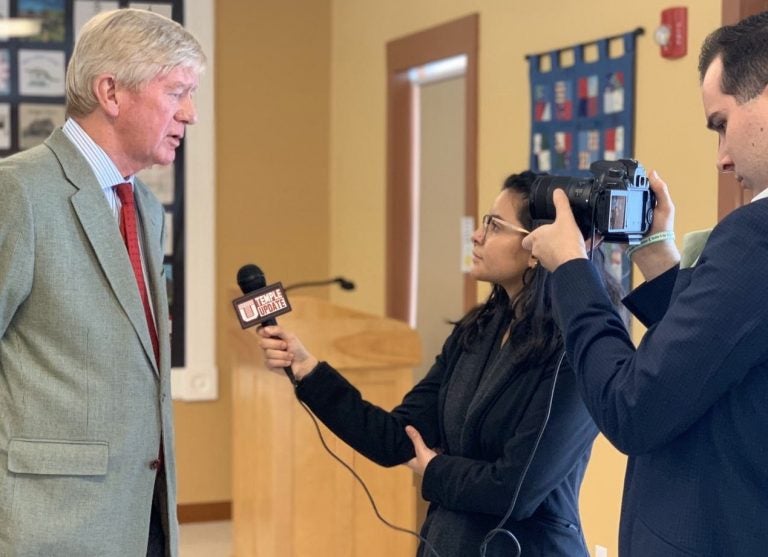
Temple students Luisa Suarez and Conall Smith (right) interviewing former Mass. Gov. Bill Weld in New Hampshire. (Kenneth Cooper)
I’m not sure when I got involved in politics.
I remember registering to vote whenever I was old enough to cast a ballot…and now, some 40 years later, I have voted in every election since.
I remember running for and winning a campaign to be class president back in 1980 at Philadelphia Central High School as one of the few African American students in the history of the school to do so.
My grandmother, who turns 100 later this year, boasts a consecutive voting record that dates back to when Franklin D. Roosevelt was president.
To say that voting and political participation is in my pedigree is an understatement.
So it was no surprise that, when I heard that one of my faculty colleagues at Temple was putting together a class on “Media and American Politics” that included five days in New Hampshire to cover the first primary of the election season, I was determined to be a part. (It turned out that – in addition to needing someone who knows a little bit about political communication – the class really just needed someone who could navigate the snowy roads of New Hampshire in a 10-passenger van and my training as a Girl Scout dad made me the perfect candidate)!
What made this so enticing was the thought of being with these 26 students from Temple. Some had never been outside of Philly. Some had recently become American citizens. Some were participating in their very first election of any kind. I was excited to see how they would handle being in the center of the political universe during one of the most important elections in their lifetimes.
It was a life changing experience, but not all roses and sunshine.
The immersion in New Hampshire was designed to be the culmination of a seven-week course that included classroom discussions, assigned readings and writing assignments. The class did research on the candidates’ various platform stances. They even created a website, www.presidentialhopefuls.org, which profiled the more than two dozen other candidates running for president that not many have seen on an ad, lawn sign or debate stage. (To get on the New Hampshire ballot, you only need to be an American who is 35 years old or older, $1,000 and a dream to pursue the chase).
Once they were on the ground, the students went everywhere. They met and interviewed all of the major candidates. They attended town hall meetings with Bernie Sanders, Elizabeth Warren and Andrew Yang. They scored interviews with both Pete Buttigeig and Joe Biden. They attended rallies adding to the surge for candidates like Amy Klobuchar while seeing sparser crowds for others whose campaigns were faltering. And despite some concern about their personal safety, the students even braved a Trump rally, seeking to gain a balanced view of the political landscape.
While the purpose of this class was to help develop the students’ journalistic skills, the reality is that the lessons learned undoubtedly will be much greater. They are learning that politics is a nasty business…no matter on which side of the aisle you may sit. They are learning that candidates often repeat their rehearsed rhetoric no matter how large or small their audience happens to be. They are learning that people wear their political identities as if it is the only characteristic that defines them.
But more than that, the students are learning that their voice matters. They’re learning that – in order to change things – they have to be more than just passive observers. They have to ask questions that don’t have easy answers. They have to push past barriers that were erected specifically to keep them out. They have to discover the power they have is limited only by the extent to which they choose to hold that power back.
And when they get dismissed for being too young or too radical or too disruptive…they are learning that they must persevere to uncover truths for themselves that others would rather keep hidden.
With the Iowa Caucus behind us and the New Hampshire primary unfolding before us, the lessons being taught here are more than simple exercises to be graded and then forgotten. Instead, these are lessons that can shape minds for a lifetime. And, when that knowledge is put to the test, the answers that emerge might just shape the world.
—
David W. Brown is an Assistant Professor of Instruction in the Klein College of Media and Communication at Temple University.
WHYY is your source for fact-based, in-depth journalism and information. As a nonprofit organization, we rely on financial support from readers like you. Please give today.


